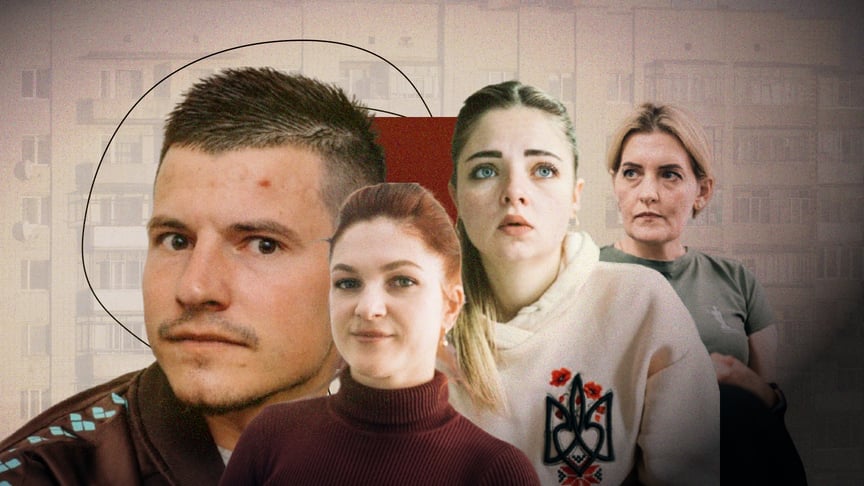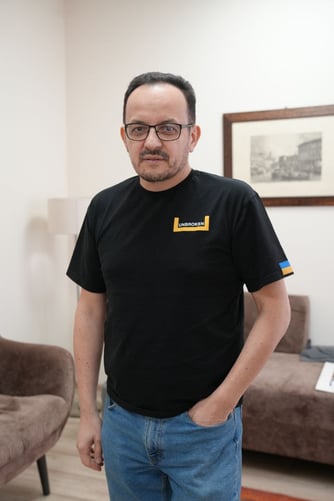“The hardest part is that as a soldier, I couldn’t defend myself; any resistance led to even harsher torture.” Recovering after captivity.

Currently, the woman is undergoing rehabilitation at the Lviv Center for Mental Health.
“The psyche of individuals who have been imprisoned suffers deep traumas due to forced isolation, torture, and the humiliation of dignity. These people have often stared death in the face and experienced severe stress. In captivity, the level of danger and fear is so high that the consciousness can no longer control the situation. There, a person survives solely through the instinct of self-preservation—this always involves distrust towards others and the situation. Therefore, after captivity, the psyche of former prisoners needs to be adapted to safe living conditions,” notes the head of the Mental Health Center, Oleg Berezyuk.
What does it mean to adapt to life after captivity? Is the adaptation process the same for men and women? What situations should be avoided to prevent reminders of the threats of captivity? Why is a psychotherapist necessary after captivity?
Hromadske traveled to Lviv to discuss with specialists from the Center for Mental Health and its patients the kind of help former prisoners need from psychotherapists.
From Euphoria to Depression
Each person who has been in the hands of Russians has their own story. However, according to military officer Maryana Mamonova, who experienced Russian captivity, they all go through the same journey upon returning home. The initial stage is euphoria from suddenly regained freedom. More than two years have passed since Maryana's release, and now she helps military personnel and former Kremlin prisoners as a psychotherapist.
“The first month at home after captivity was very eventful: I baptized my friends' children, attended a wedding, accepted invitations to birthday parties. I was constantly going somewhere, attending events,” shares Timur, a former officer of the 36th Brigade, who spent over two years in captivity.
“I want to catch up on everything I missed during captivity—modern fashion, shops, theaters, walks. Everything is interesting, everything makes me happy, I want to know it all,” adds Irina, a former cook from the "Azov" regiment, who spent two and a half years in captivity.
Maryana Mamonova states that this joy of life lasts for about two months. A person strives to fulfill everything they dreamed of during captivity. Then the euphoria fades away.
“In captivity, you spent all your resources to survive. Now you start analyzing the situation, and the experiences weigh you down. A person descends into depression, avoiding communication. But it’s not that they want to escape from society, but rather from themselves. Facing misunderstanding from relatives and friends, a person responds with anger. Sometimes I feel that those who return from captivity don’t know for a long time how they want to be treated. Because they don’t know who they are now and how significantly captivity has changed them,” Maryana explains. In the spring of 2022, she was captured as a doctor in the 36th Brigade and was released almost six months later, just four days before giving birth.
According to her, due to depression, the desire for solitude, and aggression, the true state of the traumatized psyche of a former prisoner emerges.
“And this is normal. This is how the body signals its emotional and psychological exhaustion. At this moment, it is essential to consult a psychotherapist to navigate this stage together. Overcoming these issues alone is very challenging,” emphasizes Maryana.
However, simply reaching out to a psychotherapist does not guarantee success. The former prisoner must genuinely want to be open and honest during conversations with the specialist. And therein lies the problem.
“Russians quickly teach you not to trust anyone. In captivity, you develop a habit of silence—to avoid beatings, to prevent someone from reporting on you,” says Vadim, an officer from the 35th Brigade, who spent over two years in captivity.

According to Oleg Berezyuk, the conditions of captivity undermine one of the most basic human experiences—trust in oneself, in other people, in the environment, in one's feelings, and even in one's body.
Therefore, it is crucial to restore this trust. Primarily—through a “bridge of trust” with the psychotherapist.
“At the beginning of communication with a psychotherapist, people talk about everything except their experiences in captivity. They seem to deny their traumatic experience. They are so reluctant to recall what they went through that their memory deteriorates. Thus, it is unnecessary to immediately discuss captivity with them. You should talk about whatever they want. But gradually, we still return to the traumatic experience. We need to remember everything, relive it, cry it out, accept it, and let it go—that's how it works. This is a long process,” says Maryana Mamonova.
Women—Beauty, Men—Gym
According to Oleg Berezyuk, one of the most effective methods of working with former prisoners is prolonged exposure therapy. This involves the patient returning to the most dramatic episodes of their traumatic experience with a therapist they already trust.
“But with the psychotherapist, they experience them in safe conditions. Gradually, the past is understood as a story from the past. It shifts from active memory to ‘archival’ memory, which lacks emotions. Periodically, the patient will be able to activate this story for themselves—it’s like tears at a cemetery. And then, they can again transfer the memory into painless archival memory. In other words, it’s about enabling the person to manage their emotions regarding past events,” explains Berezyuk.
Vadim consciously avoids discussing captivity with his parents—he believes they have enough pain and worries. He doesn’t want to tell acquaintances about captivity. However, he does want to talk to Maryana Mamonova. Because she can offer advice that turns out to be genuinely helpful.
“Maryana has been through captivity herself. She understands me. I talked a lot with her about how the Russians tormented me when they found out that I had been fighting them since 2014. The hardest part was that I, as a soldier, couldn’t protect myself because any move would escalate the torture. They mock you, and you just stand silently, following their orders. Maryana said that my behavior in that situation was justified because it allowed me to survive. I survived, returned to my brigade, and I will fight again. And that’s the most important thing. After talking with Maryana, I find it easier to recall all this; I vented to her,” says Vadim.
Initially, after returning, he was wary of interacting with people. Now he is no longer afraid to express his opinion and does not shy away from people. On the contrary, following Maryana's advice, he seeks out social interactions.
“I started going outside, attending movies and cafes, intentionally making new acquaintances—this worked. My irritability and outbursts of aggression occur less frequently. I realized that people are not to blame for my captivity. Captivity is a chapter of life that has passed, and life continues. By the way, Maryana taught me to manage my aggression—she advised me to think of something pleasant in life. She said that since such thoughts helped me hold on during captivity, they would help after captivity too. I tried it—it really works, it distracts me,” shares Vadim.
Timur also avoids discussions about captivity with his family.
“They will cry, and instead of tears, I need qualified help. In conversations with Maryana, I want to figure out how to live my life moving forward. Should I demobilize now or return to the army? Maryana explained to me that I will never be able to forget captivity, but I must draw conclusions from my experience. I’ve already made one: don’t put off anything until tomorrow because tomorrow may never come,” says Timur.
He expresses that he currently feels a strong sense of guilt towards his comrades: here he is with his family, fed, and safe, while they are being beaten in captivity, desperate for a piece of bread.
“Thoughts of them prevent me from enjoying life. Why was I exchanged and not them? How can I rescue them? Psychotherapists say that my feelings of guilt manifest my empathy for those guys, and that’s how it should be. I can talk to Maryana about anything—politics, relationships with civilians. After these conversations, my mind clears,” Timur shares.
Irina is currently plagued by memories of Russian cruelty in captivity—how could anyone mock living beings for fun? Not providing water for eight days? Beating them? Forbidding women from performing hygiene procedures?
“Psychotherapists help make these memories less painful. They don’t force me to divulge anything or demand answers if I don’t want to talk. They engage with me very gently, as if I were a fragile crystal vase. I genuinely feel lighter in my soul. I am no longer under supervision; I am my own master, I am